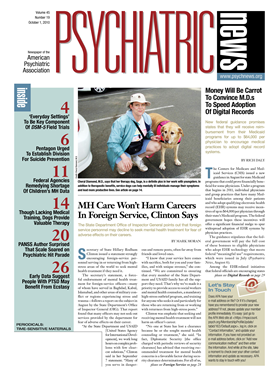The Centers for Medicare and Medicaid Services (CMS) issued a new guidance in August for state Medicaid programs that could prove financially beneficial for some physicians. Under a program that begins in 2011, individual physicians and group practices that have many Medicaid beneficiaries among their patients and who adopt qualifying electronic health record (EHR) systems may receive incentives of up to $64,000 per physician through their state's Medicaid program. The federal government hopes these incentives will offer a significant financial nudge to spur widespread adoption of EHR systems by physician practices.
The guidance stipulates that the federal government will pay the full cost of these bonuses to eligible physicians who adopt EHR technology that meets federal “meaningful use” requirements, which were issued in July (Psychiatric News, August 6).
Among the EHR-related initiatives that federal officials are encouraging states to undertake by promising to reimburse them for educational activities aimed at physicians that include workshops, webinars, and meetings. Additionally, federal officials promised to pay for most of the cost of physician help lines and call centers that provide information on EHR systems.
The incentive program for physicians whose caseloads are at least 30 percent Medicaid patients and who adopt certified EHRs by 2012 will offer a maximum payment of nearly $64,000 over six years (see
Will Your EHR System Qualify?).
The Medicaid EHR incentive is potentially more generous than the similar incentive program offered through Medicare, which provides up to $44,000 to qualifying physicians who treat many Medicare patients. However, physicians will be able to seek EHR bonus payments through only one of the two programs.
Final regulations outlining meaningful-use requirements were issued by CMS on July 13. Similarly, the Office of the National Coordinator for Health Information Technology issued final regulations the same day that outlined the standards that EHR systems must meet to qualify under meaningful use. Among the key requirements for systems to qualify for the designation is that they standardize patient data so that information can be shared among clinicians with software from different vendors.
The meaningful-use regulations initially drew praise from physician groups for easing some earlier requirements that had been proposed for physicians. However, in the weeks since the nearly 900 pages of regulations were published, some of the details have raised concerns, including the requirement for specialist physicians to collect patient data not directly related to the care they are providing. For instance, psychiatrists would have to ascertain every patient's body mass index and blood pressure, regardless of the diagnosis or treatment of their mental illness.
While the number of measures that physicians have to meet were reduced in the final regulations, the number is still too high: physicians must meet 20 measures in the first year, which is especially difficult for smaller practices that are new to the technology, said Steven Stack, M.D., an AMA board member.
“The final requirements for the meaningful use of EHRs are an improvement over previous drafts, but challenges still remain that will make it difficult for physicians to meet the requirements—especially physicians in solo and small practices,” Stack said, in a written statement.
Other concerns include questions about product availability and the tight timeline established for adoption of qualifying EHRs. Federal health officials acknowledge that no EHR is yet on the market that meets the federal meaningful-use criteria. CMS expects qualifying EHR systems to be available this fall, which would give physicians just a few months to purchase, implement, and assess their comfort with a specific EHR system before the January 1, 2011, start date of the incentive program. Physicians can still qualify for incentive payments if they begin using eligible EHRs by 2012.
It is common for physician practices to take longer than a year to decide which EHR system to purchase and to have it fully operational, according to information technology experts.
